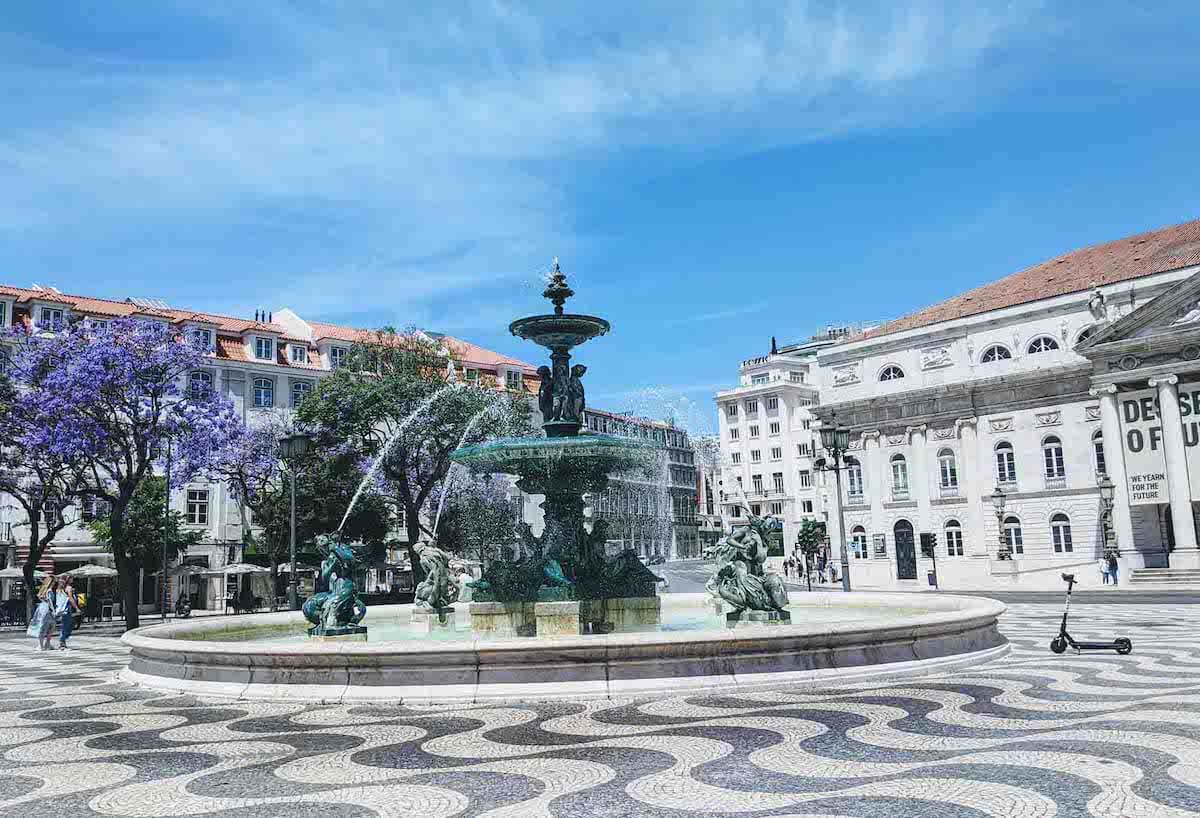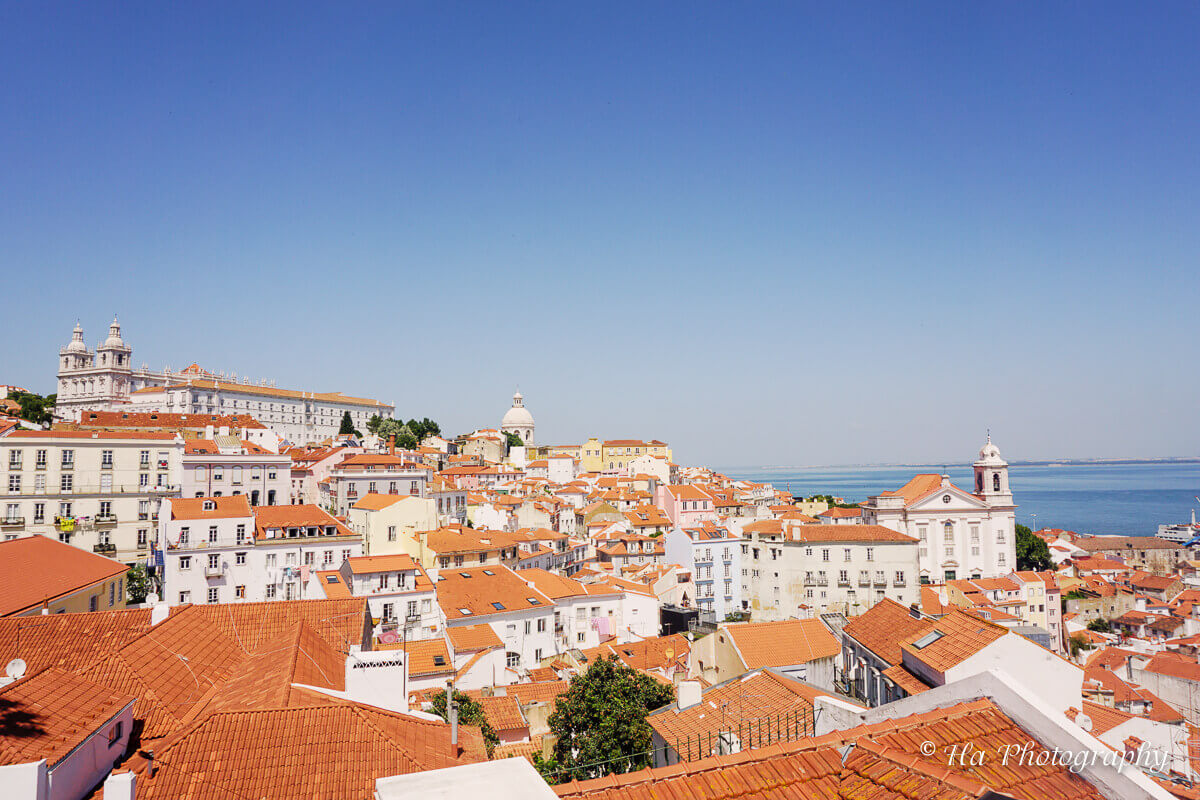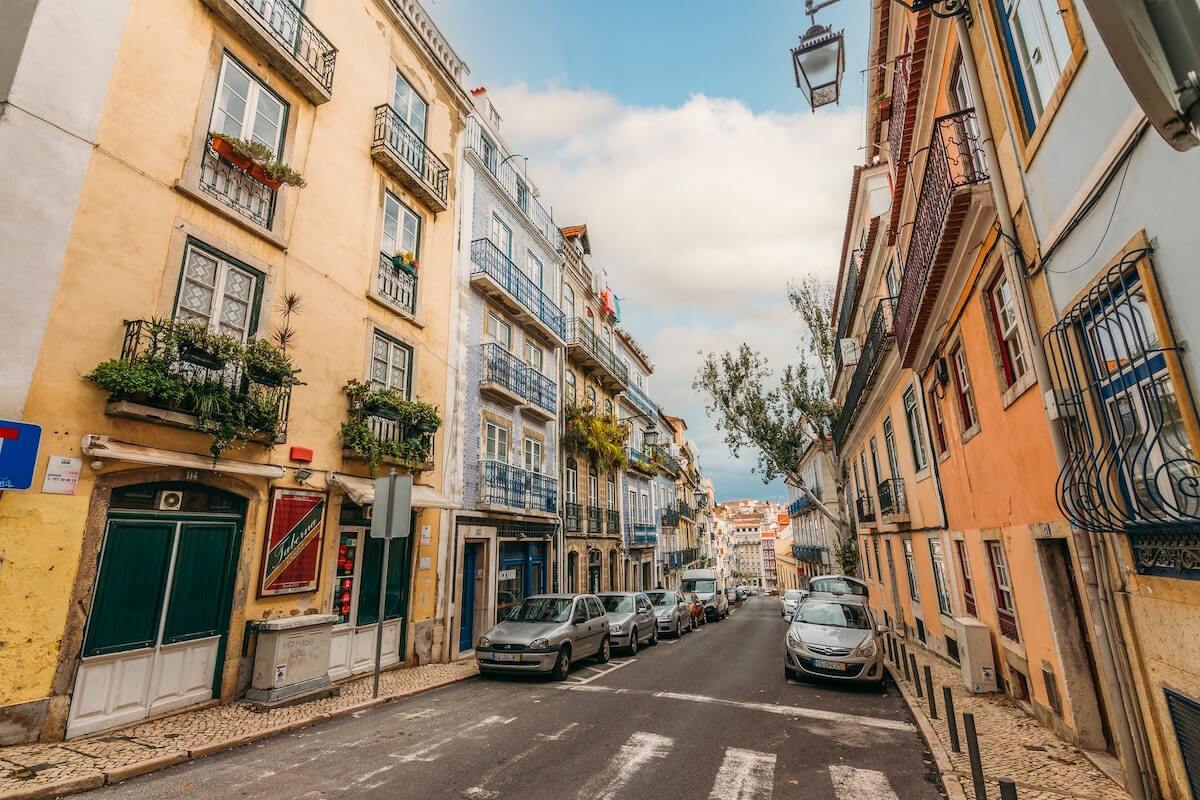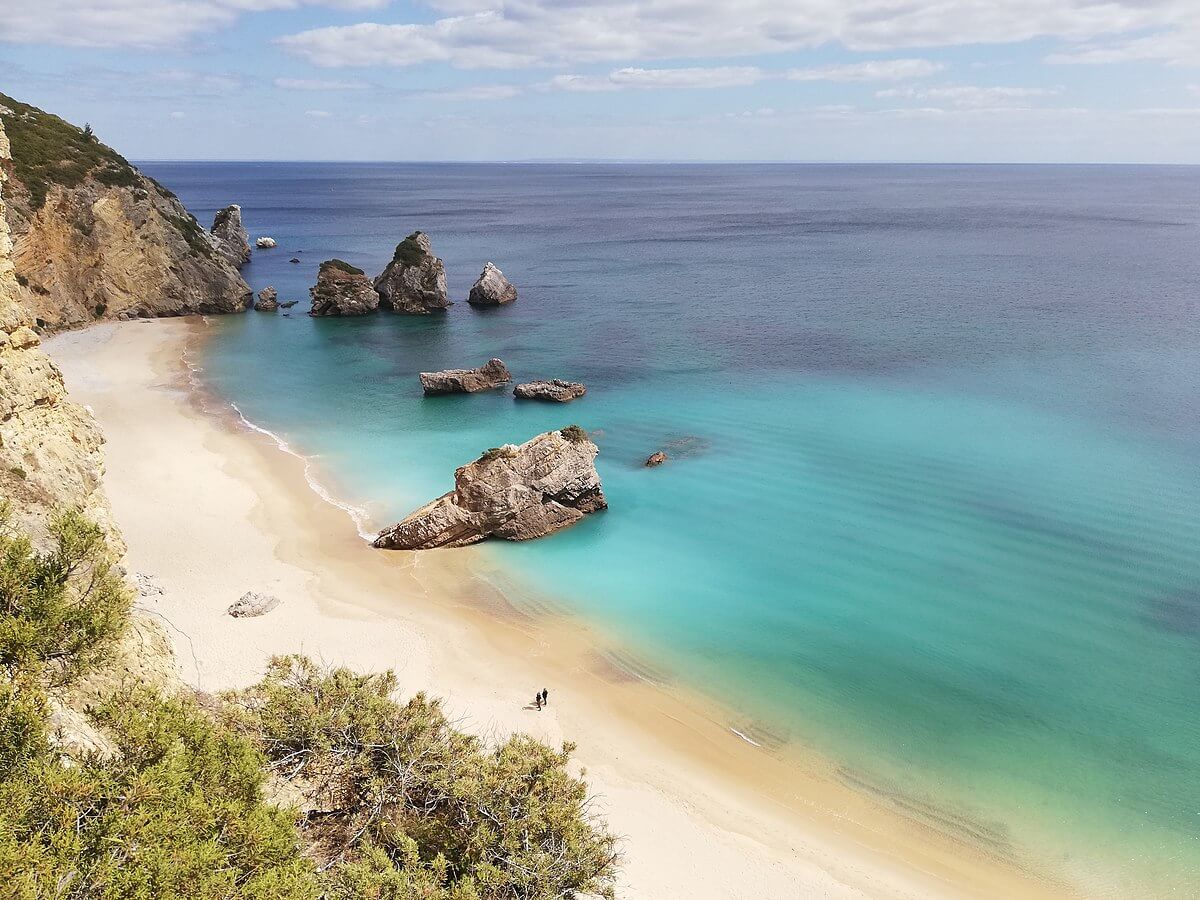Living In Lisbon, Portugal: Expat Guide
Are you planning to move to Lisbon? What is it like to live in Portugal?
In this Expat Interview, James shares his experience and practical tips for newcomers.
You’ll learn useful information to prepare for your new life in Lisbon, such as the cost of living in Lisbon, how to find apartments and jobs, and other practical tips.
What is it like to live in Lisbon?
Lisbon is a fantastic city to live in.
It’s laid-back, has good weather for a lot of the
year, and it’s incredibly beautiful.
While many people are familiar with
neighboring countries like Spain and France, Portugal is fairly unknown to most
people.
The benefit of not knowing much about a country is it’s a completely new
adventure in terms of language, history, culture, and, most importantly, food, and all of that that makes it an incredibly interesting place to live.
If you’re looking for a big, fast-moving city, this isn’t it. Rather, Lisbon suits those
that want the slow pace of life that comes with living in a southern European
country combined with some of the elements of city life.
For example, there’s the ease of meeting other people from all walks of life, things to see and do, and restaurants offering food from all over the world.

How to prepare for moving to Lisbon?
There are a lot of things that you should do before moving to Portugal, and the list could be very long, but here are some of the top priorities:
- Work out what your cost of living is likely to be and whether your income would cover that (it differs from person to person).
- Visit Lisbon to see whether the city is right for you.
- Familiarise yourself with Portuguese taxes, including the NHR regime, and ideally, book a call with an accountant to determine how much you’re likely to pay in tax.
- Check whether you can move to Portugal easily. Most EU passport holders can, but if you’re from outside the EU, you should check whether you are likely to qualify for a residency visa.
- Decide whether you’re going to ship your belongings or start afresh.
- Research local schools (if you have kids).
Another way that people could prepare more is by learning more Portuguese before they come.
There’s an assumption that once you get to Portugal, you’ll pick it up because you’ll be immersed in it, but this isn’t necessarily the case for many expats that live in Lisbon due to the amount of English spoken.
There are some great online courses out there, and many people could pick up a strong foundational level of Portuguese before they even arrive.
Tips
- Moving tips: Relocating abroad? Try Sirelo for free quotes from top international movers that fit your budget. Learn more here.
- Money transfer: I use Wise for my international transfers. Quick, secure, and their fees? Way lower than most banks I’ve tried!
- Expat insurance: Life abroad has its surprises; make sure you’re covered with expat insurance.
The cost of living in Lisbon
| Rental price (one-bedroom flat) | €1,000+ (there are cheaper options, but I don’t think they’re the norm for expats) |
| Electricity | €40-60 |
| Heating (if related) | Most people rely on space heaters or gas portable heaters. |
| Gas | €20 |
| Water | €15 |
| Internet | Around €45 per month with a 2-year contract |
| Prepaid cell phone plan | Around €20-30 per month, more for a contract plan |
| Groceries | €175-250 per month, but varies from person to person |
| Transportation | A monthly pass costs €40. Uber and other taxis are also quite affordable. |
| Average meal/ person | €10-15 for a main dish |
| One beer | €1-4, depending on where you’re drinking |
| Gym membership | Starting from around €30 for a budget gym like Fitness Hut. |
What salary do you need to live in Lisbon?
This is a difficult one to answer because people have different lifestyles.
From personal experience, you can rent a room for around €400 per month, and if your only other costs are groceries and a few beers at the weekend, you could scrape by on less than €1,000 per month.
However, that doesn’t leave much room to save or do much else, and houseshares are very hit-and-miss in terms of quality.
These days, apartments start from around €1,000-1,500, and you will also need to factor in utilities and internet on top of that.
But the price isn’t the only factor to consider. Demand is also high here, leading to some people offering more than the asking price and creating a bidding war.

Where to live in Lisbon? – The best areas to stay
In terms of areas to stay, it’s good to stick close to the metro lines if you can. Neighborhoods like Estrela, Campo do Ourique, Alcântara, Anjos, and Graça are all popular with expats, but you can also choose to live a little further outside the city.
If you choose somewhere like Cascais, Carcavelos, or Costa da Caparica, you get the benefit of the beach.
If you prefer places a little further out but don’t have the beach, you will likely find more affordable accommodation.

How to find apartments in Lisbon?
The two main places to look are Idealista.pt and many Facebook groups dedicated to accommodation in Lisbon.
You can also contact agencies like Remax directly as some agencies don’t post all their properties on classifieds sites like Idealista.pt.
Practical information about living in Lisbon
Emergency numbers and hospitals
112 is the main emergency number.
The most popular hospitals for expats are probably the CUF hospitals, a private chain of hospitals where English is widely spoken, and it’s easy to find doctors who speak other languages, like French or Spanish.
Internet and phone provider in Lisbon
The main internet providers are Vodafone, NOS, and MEO, which are the main networks for phones.
Generally, Lisbon has great fiber coverage. However, you shouldn’t assume that you’ll be able to get fiber in a property before renting or buying, and you especially shouldn’t assume that you’ll be able to pick any internet provider.
It’s not unusual for a provider to service on the street but not the one next to it. But, as mentioned, Lisbon generally has good fiber internet.
Markets and shopping in Lisbon
It’s a good idea to research the available supermarkets when choosing a neighborhood, as some will only have small metro supermarkets, which have less selection and are more expensive.
German discount supermarkets Lidl and Aldi are the most affordable and are almost always larger, so if you see one of these nearby, that’s a good sign.
Portugal is also a country where markets are still used for daily grocery shopping, unlike many other countries where they’re typically higher-end farmer or hipster markets.
If you have a market nearby, you could easily do almost all of your fruit, vegetable, meat, and fish shopping there.
If you want international supermarkets, such as Asian supermarkets, nearby, you should try to live near Martim Moniz, Anjos, and Alvalade.
Transportation in Lisbon
While public transport isn’t always fantastic in the rest of Portugal, Lisbon has great public transportation.
The metro line, in particular, makes it easy to get around, and if you can choose an apartment near the metro, it’ll make your life much easier.
As well as the metro, there are also trams, trains, buses, and ferries.
It’s also a very walkable city if you live in the city center, although it does take a few weeks to get used to the steep hills.
Of course, public transport varies considerably from neighborhood to neighborhood, so you need to check what’s available before committing to an area.
Graça, for example, has quite limited public transport, particularly as the tram that runs through it, Tram 28, has now essentially become a tourist tram.

Weather in Lisbon
Lisbon is one of the most southerly capital cities in continental Europe and gets more than 300 days of sunshine per year.
Put simply, it has great weather, particularly in winter, which in Lisbon is much milder than in the rest of Europe.
That’s not to say it doesn’t get cold or rain here. It does. When it rains, it can rain for days or weeks at a time.
And when it’s cold, it can get freezing and damp inside apartments. A dehumidifier is always recommended.
What are the good things about living in Lisbon?
There are pros and cons to living in Lisbon.
The weather, beautiful buildings, food, and – if you’re looking for it – the international scene are all major selling points.
You can have an excellent quality of life here.
What are the bad things about living in Lisbon?
There are some downsides, however.
Housing
Firstly, housing. Housing prices have shot up, both for rental and purchase, and the quality of accommodation is often relatively poor in terms of insulation which means that properties can get cold easily, and noise travels between properties.
It varies from property to property, of course; if you own the property, you can make improvements. It’s just something to be aware of.
The popularity
Another downside is the popularity of Lisbon.
Over the past few years, it has become one of the most popular cities to visit or move to.
This has brought huge benefits to the city and has meant that many rundown properties have been renovated and new businesses have been started.
Still, it’s also meant that property prices have increased, there are often wealth disparities between locals and expats, and many rental properties have been turned into Airbnb.
The city also isn’t really designed for the sheer number of tourists that visit in the summer.
This isn’t just a Lisbon problem, but the one cities all over Europe are facing, but it is something that’s hard not to notice if you live here.

What are the best things to do in Lisbon?
There are a lot of attractions in Portugal, like Lisbon Castle, Jerónimos Monastery, the Explorers Tower, and all of the attractions in nearby Sintra.
They’re all worth visiting at least once, but it’s best to visit them in the winter when the crowds are smaller.
For day-to-day living, however, I would say it is an excellent place for whittling away the hours at a café, eating out, and, in the summer, going to the beach.

Did you experience any difficulties when you first moved to Lisbon?
There are a few difficulties that I think just about everyone experiences.
The first, as already discussed, is finding a place to live that’s reasonably priced and isn’t cold, damp, or noisy.
Another challenge is bureaucracy, which people experience even before they move here if they need to apply for a visa.
Different consulates have different requirements – some want you to already have a Portuguese fiscal number, a funded Portuguese bank account, and an address in Portugal.
While others don’t ask for any of that– but either way, very few of them publish their requirements online.
You either need to do extensive research and speak to people who have applied at that particular consulate or use a lawyer and, ideally, one with experience with that consulate.
Where to meet new people in Lisbon?
If you’re moving here as an expat, there are a lot of expat groups that have regular meetups, sometimes more than once per week.
Example groups include Lisbon Digital Nomads, which has meetups that attract as many as several hundred people, and Lisbon Expats & Friends.
As well as these general meetups, you’ll also find storytelling nights, comedy nights, meetups for entrepreneurs and investors, dining groups, and groups for people with children. Meetup.com is a good starting point.
So, yes, it’s easy to meet other expats. Meeting locals is a little more difficult, but you will find that some Portuguese will attend these meetups.
Where are your favorite cafes in Lisbon?
Lisbon is a mixture of traditional Pastelarias and modern cafes that serve international coffees like flat whites and lattes.
Pastelarias are more affordable and authentic, and they’re where most Portuguese people go, so I highly recommend visiting them.
The more modern cafes are more expensive, but they are more suitable for working from and more likely to understand dietary requirements and stock products like vegan milk.
Where are your favorite restaurants and bars in Lisbon?
Again, Lisbon is a mixture of the old and the new.
For something traditional, you should look out for a ‘Tasca,’ which is a very simple, traditional restaurant that serves hearty traditional Portuguese food, usually at a very affordable price.
Unfortunately, there are fewer and fewer of these in the city every year, so be sure to seek them out sooner rather than later.
Lisbon is also an excellent place for vegetarians and vegans, which is surprising as this isn’t the case in many of the rest of the country.
You’ll find vegan and vegetarian versions of many traditional restaurants here, including vegan pastéis de nata.

Tips for finding a job in Lisbon
With some exceptions, I generally don’t recommend Lisbon as a place to come for a job.
This is because wages are low by European standards, rents are high, and the working hours are often long.
There are also fewer opportunities, particularly if you don’t speak Portuguese.
The growing tech industry can be an exception to this, and I know many people who have found great jobs in Lisbon, but I think if your main goal is to find work or develop a career, you may not find what you’re looking for here.
Of course, you do have a fantastic quality of life here, particularly in terms of the weather, the affordable cost of eating out, and the laid-back lifestyle, so this can make a reduction in wages or career opportunities worthwhile.
Generally speaking, Portugal is a great place to live if you have an income from outside Portugal.
In the past, this meant a pension, but nowadays, it can also mean a remote job or income from freelancing. Earning non-Portuguese wages and living in Portugal is the ideal way to do things.
What have you learned from living abroad?
It might sound slightly clichéd, but learning never ends when you live abroad.
You’re constantly learning about the culture you’re in – and never feel like you fully understand it – and you’re constantly learning about yourself.
Everyone must learn to be adaptable to some degree, but I think you will soon know just how adaptable you are.
Portugal isn’t a country where things run smoothly and efficiently all the time, and some people cope okay with that while others find it tests their limits.
About James
James is the founder of Portugalist, one of the most popular guides to traveling and living in Portugal, and the author of Moving to Portugal Made Simple. You can follow him on Instagram.





